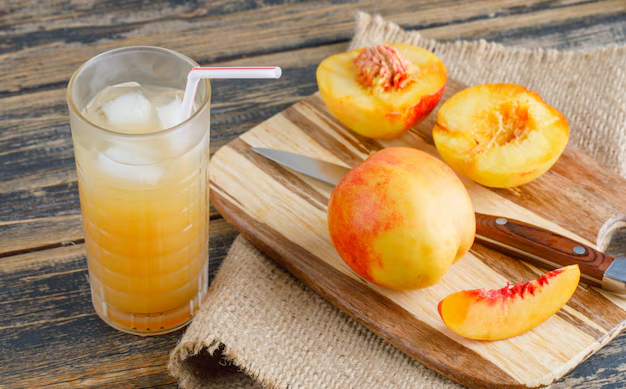Keeping Peaches Fresh: To Refrigerate or Not?
Imagine biting into a perfectly ripe, juicy peach on a warm summer's day. The sweet juice fills your mouth, and the fragrant aroma is delightful. To ensure you can savor this experience, it's crucial to know the best way to store peaches. A common debate revolves around whether peaches should be kept in the refrigerator. In this comprehensive guide, we’ll explore this topic thoroughly, offering practical insights and helpful tips.
🥭 Understanding Peaches and Their Ripening Process
The Ripening Science
Peaches, like many fruits, continue to ripen after being picked due to the production of ethylene gas. This natural process can either be a blessing or a hindrance, depending on how you plan to use your peaches. If stored improperly, peaches can overripen, becoming mealy or spoiling, which is where storage plays a pivotal role.
Room Temperature: The Natural Ripening Zone
Keeping peaches at room temperature allows them to ripen naturally. Once they reach your preferred degree of ripeness, the next step is crucial—deciding if they deserve a spot in your fridge.
🌡️ The Refrigerator Debate: Points to Consider
When to Refrigerate
Refrigeration is a tool that can extend the shelf life of your peaches once they reach peak ripeness. Cold temperatures slow down the ripening process, reducing the speed at which peaches deteriorate. Storing ripe peaches in the refrigerator can preserve them for an additional 3 to 5 days. However, the cold can sometimes dull the flavor and alter the texture if they’re kept too long.
Potential Downsides of Refrigeration
- Flavor Impact: Coldness can mute the natural, sweet flavor of peaches.
- Texture Change: Extended refrigeration may turn peaches mealy.
- Chill Damage: If peaches are placed in the fridge before they fully ripen, they can become damaged due to chill stress, affecting flavor and consistency.
Best Practices for Refrigeration
To preserve flavor as much as possible:
- Place peaches in a plastic bag, perforated to allow some air circulation.
- Store them in the fridge's crisper drawer.
- Check them daily for any signs of deterioration.
🍽️ Contextual Uses: Peaches for Every Occasion
Fresh Eating
For the best eating experience, many prefer their peaches to ripen naturally on the counter. The full, aromatic flavor is often at its peak when left to ripen at room temperature.
Peaches in Recipes
If you plan to use peaches in cooking or baking, such as in pies or jams, refrigeration may be less of a concern since the cooking process can compensate for slight texture changes.
Smoothies and Juices
For smoothies and juices, refrigerated peaches can be convenient. Cold peaches blend well, providing a refreshing chill to your drinks without the need for additional ice.
📋 Practical Tips and Takeaways
Storing Peaches
Here's a quick summary of the best practices for storing peaches:
- Ripen at Room Temperature: Allow peaches to reach desired ripeness on the counter.
- Refrigerate When Ripe: Place in the fridge if you won't eat them immediately.
- Use Perforated Bags: Helps maintain optimal humidity and air flow.
- Monitor Regularly: Check daily for ripeness and quality.
- Avoid Pre-Chilling: Don’t refrigerate to slow the initial ripening process; let nature take its course first.
🍑 Quick Tips for the Best Peach Experience
- 🍑 Immediate Use: Keep at room temperature and consume when ripe.
- 🥶 Short-Term Storage: Refrigerate when peak ripeness hits.
- 🗓️ Plan Ahead: Decide based on when you plan to eat or use the peaches.
🍏 Peaches and Other Fruits: A Broader Context
Fruit Storage Basics
Peaches are not the only fruit with specific storage needs. Learning about the best storage practices for other fruits can optimize your entire produce collection.
Similar Fruits
- Nectarines: Closely related to peaches, nectarines benefit from similar handling.
- Plums: Share the ethylene sensitivity and can also be ripened on the counter before refrigeration.
Different Approaches
- Apples and Pears: Usually benefit from immediate refrigeration once ripe.
- Berries: Fragile and best kept cool to prolong freshness.
The Role of A Refrigerator in Your Kitchen
Knowing which fruits to refrigerate and which to keep at room temperature is key to maintaining their best quality. The refrigerator’s primary role is prolonging freshness once fruits are ripe, but it should not be used to rush or alter natural ripening, especially for peaches.
✨ Summing It Up with Some Key Takeaways
- Monitor Ripeness: Allow peaches to ripen naturally at room temperature.
- Strategic Refrigeration: Only refrigerate once they are ripe to slow further ripening.
- Recipe Influence: Decide storage based on how you plan to use the fruit.
- Counter-Colleagues: Store similarly ripening fruits together to mimic best practices.
By understanding and applying these principles, you can enjoy your peaches at their juiciest and flavorful best, whether you choose to refrigerate them or not. This guide aims to empower you with the knowledge to make the best decision for your delicious peaches, ensuring that every bite is as satisfying as the last. 🍑

